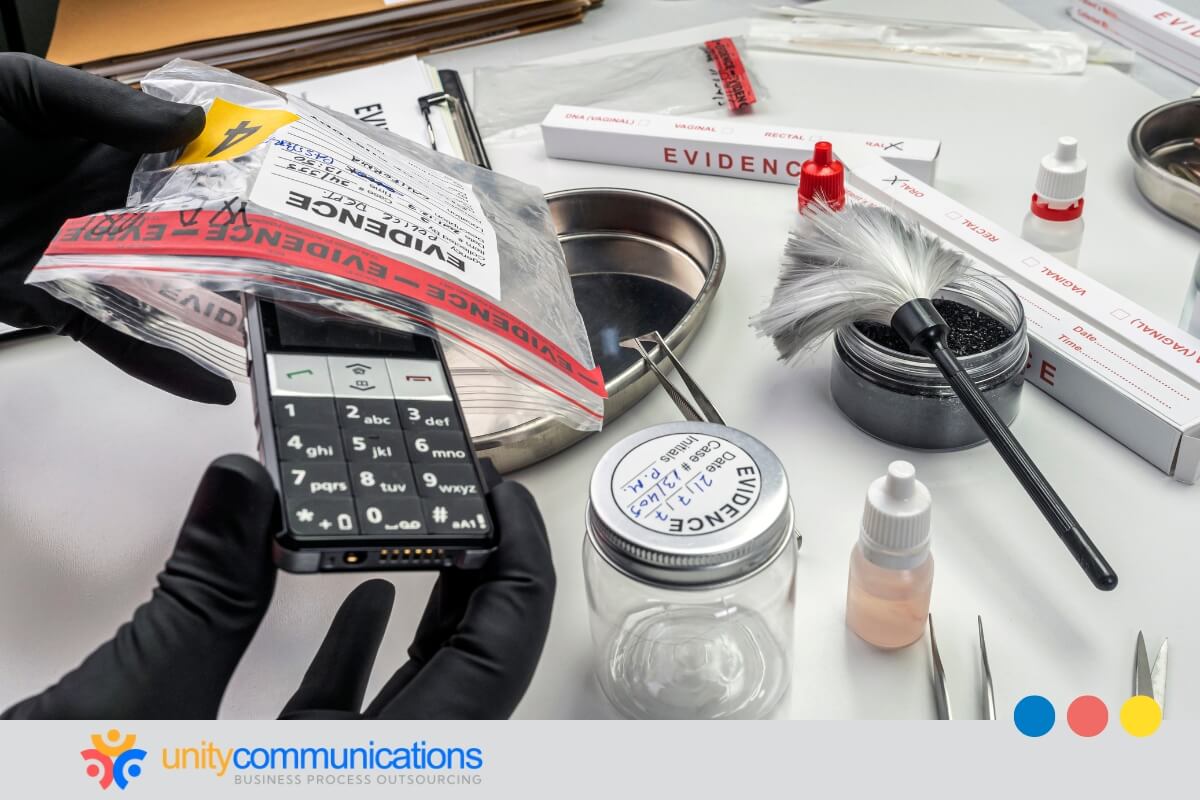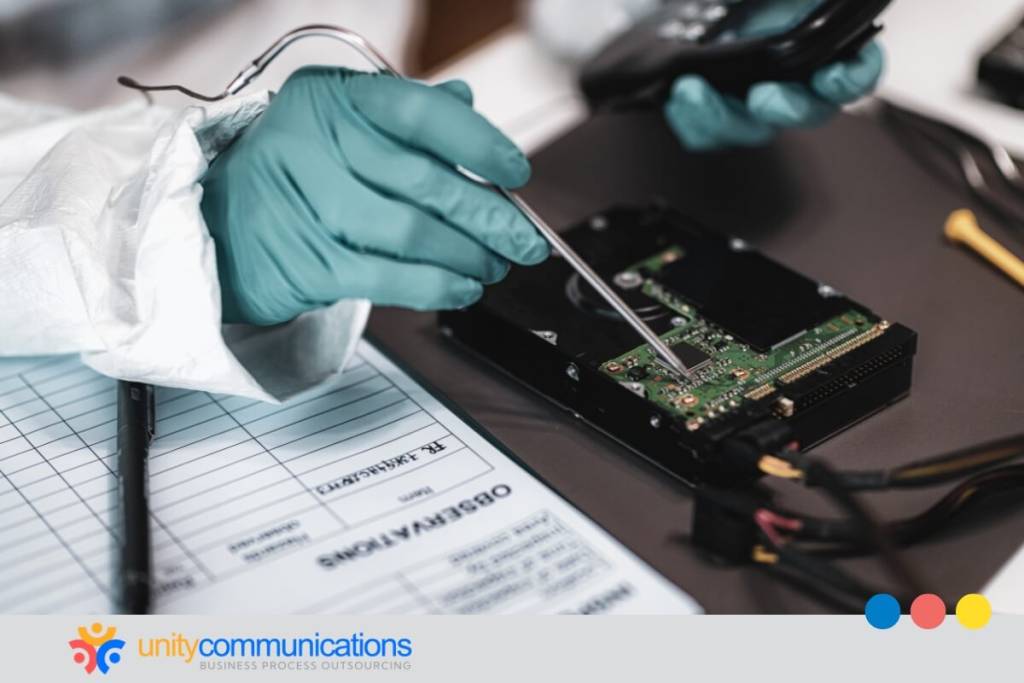IN THIS ARTICLE
Table of Contents
Approximately 88.5 million people fall victim to cyberattacks each year, and the cost of cybercrime can reach $13.82 trillion by 2028. This escalating threat demands effective investigations.
Business process outsourcing (BPO) offers a powerful solution for information technology (IT) security firms, law enforcement agencies, and legal teams seeking to bolster their investigative capabilities. BPO providers have the expertise and resources necessary to boost investigations.
Keep reading to explore the growing role of BPO in digital forensics and the many ways it can benefit your operations.
Leveraging specialized expertise through BPO in digital forensics

Digital forensics requires a thorough understanding of computer systems, data storage methodologies, and legal procedures. BPO providers employ experienced digital forensics experts who can collect, analyze, and present digital evidence in a court-admissible manner.
But before exploring the details, let’s first define what BPO is. This practice involves delegating specific tasks to specialized service providers. You get access to third-party experts adept at handling a broad spectrum of investigations, including:
- Cybercrime – data breaches, identity theft, online fraud, and hacking attempts
- Internal investigations – employee misconduct, intellectual property theft, and data leaks
- Electronic discovery (e-discovery) – collection and preservation of electronically stored information (ESI) for legal proceedings
BPO specialists swiftly and proficiently analyze digital evidence from computers, mobile devices, cloud storage, and Internet of Things (IoT) devices. This frees up your resources for other essential aspects of the case.
Utilizing advanced forensic technologies and tools
BPO providers invest heavily in cutting-edge forensic technologies and tools. These innovations can automate tedious tasks, enhance accuracy, and expedite investigative processes.
Here are some prominent BPO tech examples:
- Data carving and acquisition tools recover deleted or hidden data from digital devices, ensuring a comprehensive investigation.
- Forensic analysis software analyzes user activity, file systems, and network logs to detect anomalies, reconstruct timelines, and identify potential perpetrators.
- E-discovery platforms streamline the collection, processing, and review of vast volumes of ESI, saving time and resources.
- Artificial intelligence (AI) and machine learning (ML) automate digital evidence identification, detection, extraction, and analysis.
BPO organizations stay updated with the latest advancements in computer forensics to continuously improve investigation processes and outcomes.
Enhancing data collection and analysis accuracy
Keeping a chain of custody is critical to guaranteeing the admissibility of digital evidence in court. BPO providers have well-defined processes for collecting, preserving, and analyzing digital evidence, minimizing the risk of data contamination and safeguarding the evidence chain’s integrity.
BPO teams use advanced forensic science tools and techniques to extract data from various devices soundly and securely. This meticulous approach strengthens your case as the collected evidence remains accurate and reliable.
Improving response times for investigations

Time is critical in any investigation, especially in an incident response process. BPO in digital forensics offers 24/7 availability, allowing you to initiate the investigation process immediately following a security incident.
Swift action minimizes data loss and alteration by securing the environment and preserving evidence. BPO in digital forensics helps quickly identify and contain threats, preventing further damage while preserving crucial evidence for later analysis.
Ensuring data security and integrity
In 2023, DarkBeam’s data security failure exposed 3.8 billion records, including user emails and passwords, from reported and unreported breaches. This incident is one of the largest in history and highlights the urgent need to implement robust data security measures to secure sensitive information and prevent similar occurrences.
BPO providers protect data by:
- Securing data centers with limited access controls and constant monitoring
- Encrypting data at rest and in transit to ensure confidentiality
- Regularly auditing security protocols and conducting penetration testing to identify and address any vulnerabilities
A BPO provider with robust security can protect sensitive data throughout the investigative journey.
Reducing costs and optimizing resource allocation
Building and maintaining in-house digital forensic teams can be expensive. BPO in digital forensics offers a cost-effective alternative by allowing access to specialized skills and technology as needed. This approach provides several benefits:
- Avoid the high cost of hiring and training specialized digital forensics staff.
- Eliminate the need to invest in expensive forensic tools and infrastructure.
- Scale outsourced operations to meet the fluctuating demands of your investigations.
Outsourcing digital forensics allows you to reallocate savings to other critical security initiatives and core business functions.
Customizing forensic solutions to fit investigation needs

Every investigation is unique; thus, a tailored approach is necessary. BPO providers offer customizable forensic solutions to suit the specific requirements of each case.
Here are crucial steps to tailor forensics to address an investigation’s unique challenges:
- Define the scope of the investigation.
- Identify the relevant devices and data sources, including computers, mobile phones, cloud storage, and IoT devices.
- Select the appropriate forensic tools and techniques based on the evidence sought.
- Develop a transparent chain of custody to guarantee the evidence’s admissibility in court.
BPO teams collaborate with you to understand your objectives and develop a comprehensive forensic plan that delivers your desired results. This strategy eliminates the “one size fits all” approach and promotes optimal investigation outcomes.
Integrating forensic services with existing security protocols
A robust security posture requires a unified approach to digital forensics and incident response (DFIR). BPO providers understand the importance of DFIR processes, and they can work with your security teams to:
- Develop a coordinated response plan. This plan minimizes delays and maximizes evidence collection by ensuring a smooth transition from incident detection to forensic investigation.
- Analyze forensic data for root-cause analysis. The BPO team identifies the source of the security incident to determine ideal mitigation strategies and prevent recurrence.
- Provide ongoing monitoring and incident response support. BPO providers continuously monitor the IT infrastructure to detect potential threats and offer responsive support during security incidents.
Integrating BPO with existing digital forensics security protocols streamlines how you respond and investigate cyberattacks. This convergence strengthens your security strategies.
Continuous monitoring and proactive threat detection
More than 2,200 cyberattacks occur daily, and threats continuously evolve. This emphasizes the need for robust security measures. BPO providers offer continuous monitoring services to help prevent breaches, including:
- Log monitoring – analyzing system logs for anomalies or unauthorized access attempts
- Network traffic monitoring – detecting suspicious traffic patterns that might indicate malware
- Vulnerability scanning – identifying exploitable weaknesses in your systems
By continuously monitoring your operating systems, BPO providers can detect threats early and initiate a digital forensics investigation before significant security breaches occur.
BPO in digital forensics: Case studies and success stories

Here are outsourcing case studies highlighting how BPO can yield significant results in digital forensics:
Case study 1: Recovering stolen intellectual property
A tech company suspected a disgruntled employee of stealing intellectual property. To investigate, the company partnered with a digital forensics BPO team. The forensics experts used advanced tools to analyze user activity logs on the employee’s computer system to determine if they took intellectual property.
Despite the employee’s attempts to conceal their activities by wiping devices and encrypting files, the team retrieved and decrypted the data using advanced forensic techniques. They recovered stolen code and proprietary information from the employee’s personal devices and cloud storage accounts.
The tech company used this evidence to file a successful lawsuit against the former employee for intellectual property theft, securing a favorable outcome and recovering their stolen property.
Case study 2: Detecting fraudulent activity
When an online retailer received numerous customer complaints about compromised credit card information, it suspected a breach. An internal investigation revealed malicious code injected into its website. The retailer contacted a digital forensics provider to uncover the source and remediate the problem.
The forensics team found a sophisticated attack that compromised the server without crashing systems. They identified the breach’s origin, obtained root access, and discovered a code inserted on pages requiring credit card information. They swiftly closed all access points, removed the malicious code, and initiated round-the-clock security monitoring.
The bottom line
Partnering with a BPO provider gives you access to specialized skills, advanced forensic technologies, and a proactive approach to security. This partnership can significantly improve the investigation’s quality, leading to faster resolutions, more substantial cases, and an improved security posture.
Let’s connect to further discuss outsourcing and its transformative impact on your business operations!





